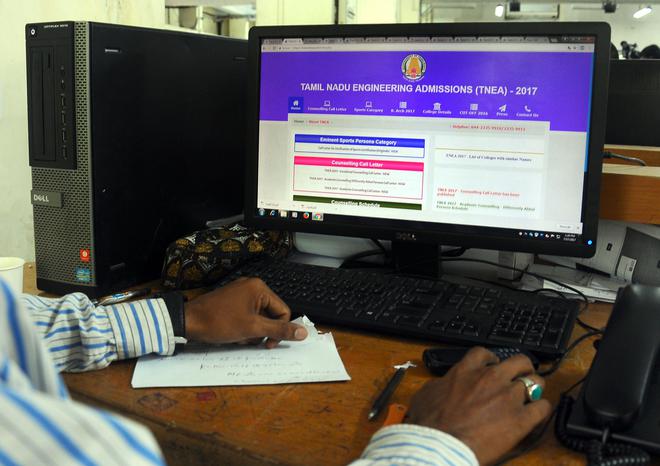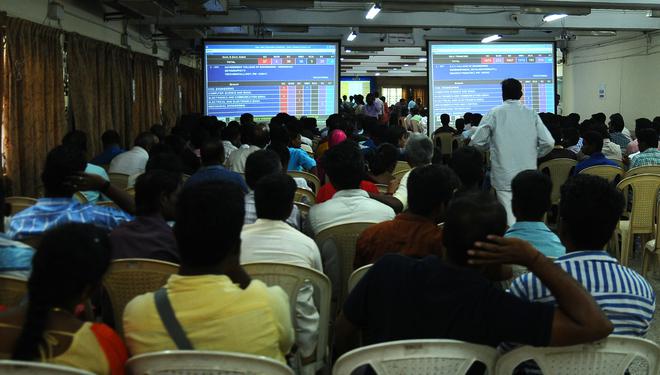This year, a large number seats were allotted through the single window counselling conducted by the Directorate of Technical Education (DoTE) for seats in engineering colleges in Tamil Nadu. As many as 65.08% seats were filled, as compared to last year when only 59.90% sets were taken. Of the 1,44,630 seats that were available for counselling by DoTE, a total of 94,122 were filled. This is an indication that engineering courses continue to remain a favourite among students.
There were not, however, too many surprises during the counselling process this year. As has been the case over the past decade, computer science and engineering (CSE) is the most preferred course. At Anna University’s College of Engineering, as many as 30 candidates in the Backward Class (BC) and Open Category (OC) with full marks, have chosen CSE.
Similarly, the cut-off for electronics and communications engineering (ECE) in the OC category has been 200. A total of 102 candidates obtained the full cut off mark of 200, as per data released by the Tamil Nadu Engineering Admissions (TNEA) 2023 committee.
Are jobs available for popular courses?
The toppers’ choice of subjects invariably dictates how students with lower cut-off marks, will choose. So, even in the second round and third round of TNEA counselling, there was a noticeable bias for CSE and circuit-related courses. This however, say education experts, is a concerning trend, as when these students graduate in four years’ time, they may not get the jobs they have studied for, as hiring has slowed down.

It is unclear how students make their choice of the subject though, say education consultants. Most students, and parents, choose based on what they perceive is the choice of their peers and the enduring charm for CSE continues.
An analysis of the seats taken shows that a handful of institutions, namely the autonomous Anna University department at the MIT campus, Chromepet; the non-autonomous Central Electrochemical Research Institute (CECRI) Karaikudi and the non-autonomous PSG Institute of Technology and Applied Research; the Government College of Technology, Coimbatore; Central Institute of Petrochemicals Engineering & Technology, Chennai; Government College of Engineering, Srirangam; the Government Institute of Technology, Vellore; Anna University’s regional campus in Coimbatore; the Government College of Engineering, Tirunelveli; Government College of Engineering (Formerly Institute of Road and Transport Technology), Erode and Kongunadu College of Engineering and Technology, managed to fill 100% of their seats after the three rounds of counselling and the conversion of SC seats.
In the current year, over 120 colleges filled above 90% of their seats. However, except for a handful of colleges, the average cut-off for most of these institutions has hovered around 130 marks.
Poor admissions at many institutions
While the All India Council for Technical Education opened up the engineering education sector as the Union government believes that is the only way to help more students enrol into higher education, many institutions continue to struggle to fill their seats.
While Anna University’s departments and some of the better institutions have managed to fill all their seats through the month-long counselling, as many as 15 colleges filled less than 10% seats and at least 75 colleges managed to fill less than 30% of their seats only. Poor admissions also point to the lack of quality, of infrastructure and faculty, the lack of industry-academia connect and other such issues at low-performing institutions.

Other than CSE, students have opted for ECE, Artificial Intelligence (AI) and Data Science (DS) and Information Technology. However, courses such as production, aeronautical engineering, biotechnology, petroleum and pharmaceutical engineering are not on the lists of most students.
As has been the case for many years, colleges in Chennai and Coimbatore had no difficulty in filling their seats. But lower rung colleges, including in the government sector have faced difficulties. Remote branches such as industrial engineering and management and textile chemistry have not found takers, said independent education consultant Jayaprakash Gandhi.
V. Balusamy, principal of the Kongu Engineering College, said the order of preference has been CSE, IT, AI and DS and AI and ML (machine learning) at his institution. “There has been a slight change: more students have shown an interest in ECE this year,” he said. If students were unable to garner a seat in CSE then they opted for ECE, EEE (electrical and electronic engineering), electronics and instrumentation or controls and instrumentation. The preference for traditional core branches such as civil, mechanical and materials engineering has been low, he said.
“We have been talking for a long time about recession. We find it has set in, in IT branches. We expected it to get postponed, but it appears that the job market will fall in IT branches. We are a little worried as jobs in the IT branches will fall this year and the next year. But this message is yet to reach the parents,” he explained.
“This year, there have been enquiries for circuit and traditional branches as manufacturing industries are asking for more workforce,” Mr. Balusamy added. The demand for courses in reputed colleges has risen, as many colleges have reduced their intake, he pointed out.
Emerging companies
Recruitment at the end of the course actually drives preference for courses. However, over the past five years emerging companies have increased their recruitment, according to Mr. Balusamy. “We are surviving due to this. Our alumni have got together as a group and started companies that focus on AI and data analytics; also, companies that focus on automation, IoT are are also big recruiters,” he said.

The recession is also good news for core branches such as civil and mechanical engineering, Mr. Balusamy said. The fall in IT jobs would mean more students would consider EEE and ECE or even mechanical and civil engineering, he added.
Also read | Engineering colleges anxious as companies cut campus recruitment
Ayyakannu, director of industrial relations and projects at Muthayammal Engineering College in Rasipuram, said at his college, students preferred AI, cybersecurity and medical electronics, followed by CSE and IT. The third preference is EEE, ECE and EIE (electronics and instrumentation engineering) while mechanical and civil engineering are the last choices.
The visibility factor
How a student chooses a college, depends on how visible it is. This is particularly true of colleges that admit students with a cut off 180 and above. In the past word of mouth helped a college build its reputation. Now, students use other means of communication to spread the word around faster.
Career consultant Jayaprakash Gandhi said colleges with better visibility on social media are garnering a higher preference. It helps if the college management encourages students to post their achievements on social media. Peer perception and alumni networking are the other factors that encourage a student to apply to a college.
But not all colleges rely on a social media presence. Hari Thiagarajan, chairman and correspondent of Thiagarajar College of Engineering in Madurai said this year, there was a 20% increase in admissions. The order of preference has been CSE, ECE and IT, over the past three years. The college broke new pathways when it was rated in the 1201-1500 colleges in India by the Times Higher Education’s World University Rankings 2024, Mr. Hari pointed out.

The college has been offering courses in emerging areas for some time. It now offers a five-year integrated MSc programme in Data Science and next year, it has proposed to launch a course in AI and ML. Mr. Hari also surmised that placement could be quite tepid for students of the 2023-24 batch. “We believe there will be a pinch in hiring,” he added.
Colleges like his rely on the industry to pick students. A start-up culture, which is vibrant in Chennai and to some extent in Coimbatore, is still to pick up steam in Madurai, Mr. Hari pointed out.
Of the total number of engineering seats, 53,368 seats in CSE and related programmes were filled, amounting to over 50% of the seats. ECE with 17,308 seats (16.48%) was followed by mechanical engineering with 9,013 seats (8.58%) available seats being filled. While 8,551 students opted for electrical and electronics, only 4,290 (4.08%) students opted for civil engineering.
“Out of 1,05,028 seats filled in general counselling by the TNEA 2023 committee, 53,368 seats (50.81%) were filled only in computer science-centric courses. The layoffs, hiring freezes and planned recruiting slowdowns in IT organisations may create uncertainty for college students seeking placements and internships in the future. Top, product-based IT organisations have already started reducing the initial salary package for freshers by at least 30%. Students must understand that only the talented and competitive will be successful. Another setback for CSE students is that IT organisations recruit not only CSE students but also all engineering, arts and commerce students too, and hence only the talented one will get the opportunity to go further,” said R. Ashwin, a National Institute of Technology (NIT), Warangal alumnus and career guidance expert.
Admissions under the preferential quota
More students have been admitted from government schools this year, as compared to last year. There was an increase of 408 seats this year in comparison to last year as well. This year 2,295 more seats were filled, accounting for an increase of 16.97% in admissions.
It has also been noticed that non-autonomous colleges struggle to fill seats while autonomous colleges manage to fill more seats.
Also read | Data reveals only 9 out of 392 non-autonomous colleges have over 90 pass percentage this year
For engineering colleges to remain relevant they must reinvent themselves, Mr. Gandhi said. Government engineering colleges that have done well, have invested in good infrastructure. Those with poor infrastructure and laboratory facilities have not fared well, he pointed out.
If students prefer autonomous colleges, then it is thanks to the effort that these colleges put into improving their facilities. Autonomous colleges go the extra mile to develop a connection with industries. They also ensure that their students benefit from industry visits and training.
More girls enter engineering
S. Kuppuswami, executive director of the autonomous Vivekanandha College of Engineering for Women said more girls are showing an interest engineering. “Last year I could not accommodate 200 girl students and we had to find ways to accommodate them in other colleges. This year we had 50 more students than we could admit,” he said.
“People who are coming here look at infrastructure and opportunities thrown open to them. In 2018-19 we filled only around 65% of our seats but subsequently, the admissions are improving slowly and for the past three years we have filled 100% of our seats,” he said
According to him if the students take up some skilling exercises, they would do very well. However, admissions are also based on the demands of the industry. “I am worried that political changes in the Middle East could result in lower investments in development projects,” he said, and this would adversely affect admissions he feared, echoing Mr. Hari Thiagarajan’s concern that next year, admissions could dip.


.jpg?w=600)




